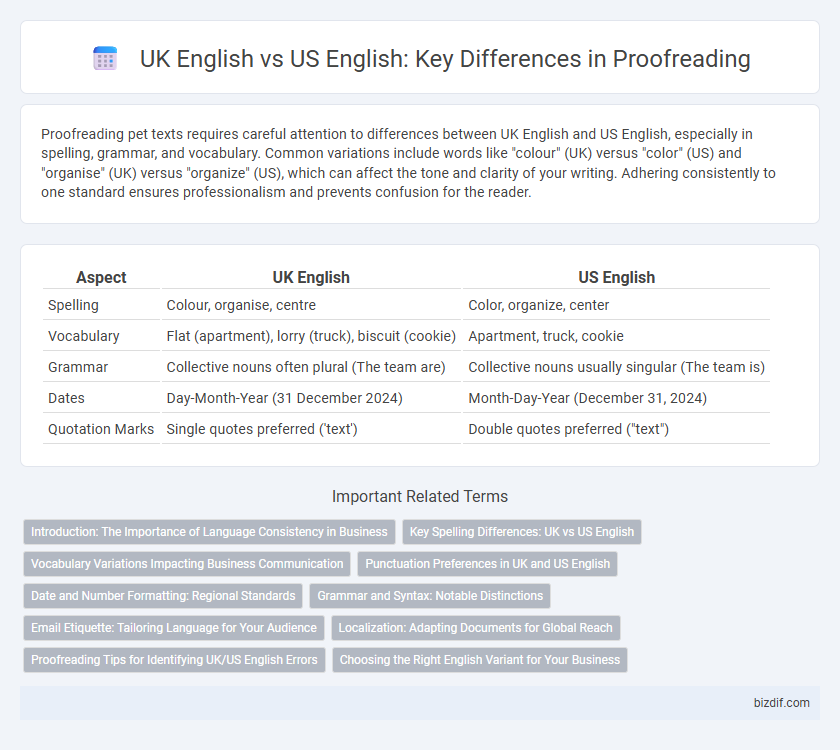Proofreading pet texts requires careful attention to differences between UK English and US English, especially in spelling, grammar, and vocabulary. Common variations include words like "colour" (UK) versus "color" (US) and "organise" (UK) versus "organize" (US), which can affect the tone and clarity of your writing. Adhering consistently to one standard ensures professionalism and prevents confusion for the reader.
Table of Comparison
| Aspect | UK English | US English |
|---|---|---|
| Spelling | Colour, organise, centre | Color, organize, center |
| Vocabulary | Flat (apartment), lorry (truck), biscuit (cookie) | Apartment, truck, cookie |
| Grammar | Collective nouns often plural (The team are) | Collective nouns usually singular (The team is) |
| Dates | Day-Month-Year (31 December 2024) | Month-Day-Year (December 31, 2024) |
| Quotation Marks | Single quotes preferred ('text') | Double quotes preferred ("text") |
Introduction: The Importance of Language Consistency in Business
Maintaining language consistency in business communications ensures clarity, professionalism, and brand integrity, particularly when choosing between UK English and US English. Proofreading plays a critical role in identifying and correcting regional spelling, grammar, and vocabulary differences to avoid misunderstandings. Consistent use of either UK or US English strengthens audience engagement and fosters clear, effective communication in international markets.
Key Spelling Differences: UK vs US English
Key spelling differences between UK and US English include variations such as "colour" (UK) versus "color" (US), and "organise" (UK) as opposed to "organize" (US). UK English typically uses "re" endings in words like "centre," contrasting with the US preference for "er" in "center." Recognizing these distinctions enhances proofreading accuracy, ensuring content is appropriately localized for its target audience.
Vocabulary Variations Impacting Business Communication
Vocabulary variations between UK English and US English significantly impact business communication by causing potential misunderstandings or misinterpretations in documents, emails, and contracts. Terms such as "billion" (UK: 1 million million; US: 1 thousand million), "lorry" (UK) vs. "truck" (US), and "holiday" (UK) vs. "vacation" (US) can lead to confusion if not standardized. Ensuring consistency in vocabulary choice enhances clarity, reduces errors, and fosters smoother international business interactions.
Punctuation Preferences in UK and US English
UK English punctuation typically places punctuation marks like commas and periods outside quotation marks unless part of the quoted material, whereas US English tends to place them inside regardless of context. In UK English, single quotation marks are preferred for initial quotations, switching to double quotes for quotes within quotes, differing from the US preference for double quotation marks primarily. These distinct punctuation conventions impact clarity and style in proofreading, requiring careful attention to regional standards.
Date and Number Formatting: Regional Standards
UK English uses the day-month-year format for dates, such as 25 December 2024, while US English employs the month-day-year format, for example, December 25, 2024. Numbers in UK English typically use a comma to separate thousands and a full stop as a decimal marker (e.g., 1,000.50), whereas US English follows a similar numeric convention but may differ in style preferences depending on context. Proofreaders must ensure consistency with regional standards in documents to maintain clarity and professionalism.
Grammar and Syntax: Notable Distinctions
UK English grammar often employs the present perfect tense to express recent actions, whereas US English frequently uses the simple past in similar contexts. Syntax differences include variations in preposition usage, with UK English favoring phrases like "at the weekend" compared to the US preference for "on the weekend." Spelling distinctions also impact grammar rules, affecting verb forms such as "learnt" in UK English versus "learned" in US English.
Email Etiquette: Tailoring Language for Your Audience
UK English email etiquette emphasizes formal greetings like "Dear Sir/Madam" and closing phrases such as "Kind regards," while US English tends to favor more casual openings like "Hi" and closings like "Best." Tailoring language for your audience in proofreading ensures clarity and appropriateness, acknowledging spelling differences such as "colour" (UK) versus "color" (US). Adapting tone and vocabulary according to regional preferences enhances professionalism and reader engagement in email communication.
Localization: Adapting Documents for Global Reach
Localization in proofreading involves adapting UK English and US English variations to suit the target audience's cultural and regional preferences, ensuring clarity and relevance. Differences in spelling, vocabulary, and grammar require meticulous attention to maintain the intended meaning and tone across markets. Effective localization enhances global reach by aligning language use with local conventions, improving reader engagement and comprehension.
Proofreading Tips for Identifying UK/US English Errors
Proofreading UK and US English texts requires keen attention to spelling variations such as "colour" versus "color" and vocabulary differences like "flat" versus "apartment." Focus on identifying inconsistencies in punctuation styles, including the use of single quotes in UK English compared to double quotes in US English. Recognizing these subtle linguistic distinctions ensures accurate and context-appropriate text editing.
Choosing the Right English Variant for Your Business
Selecting the appropriate English variant for your business ensures clear communication and cultural relevance, enhancing brand credibility and customer trust. UK English is preferred for businesses targeting audiences in the United Kingdom, Europe, and Commonwealth countries, while US English suits markets in the United States, Canada, and major global trade partners. Consistency in spelling, grammar, and punctuation throughout all content is critical to maintain professionalism and avoid misinterpretations.
UK English vs US English Infographic

 bizdif.com
bizdif.com